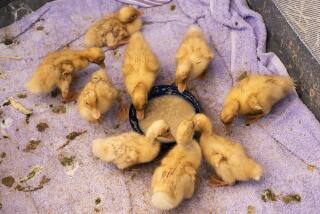Other Peninsula Cities Are Watching Peacock Project in R.H. Estates
- Share via
If an Iowa farmer’s blueprint for settling the peacock wars in Rolling Hills Estates proves effective, some are suggesting that the plan should be expanded to cover the entire Palos Verdes Peninsula.
“The whole peninsula could well get involved in this,” said Carl Allen, a resident of Palos Verdes Estates. “ . . . Maybe we could even form a peacock foundation to care for the birds and handle any problems.”
For peninsula residents, the problems with the peacocks has been a long time in coming.
The exotic Indian Blue peafowl was first imported to the peninsula’s Portuguese Bend area in the 1920s. Admired for their regal bearing and strutting displays, the turkey-sized birds proliferated.
Over the years, their growing numbers have become noisy problems for some residents in neighborhoods of all four peninsula cities. Yet, no concerted effort has ever been made to study the problems or come up with common ways to protect the birds and still give some peace to those who don’t want them nearby.
Rolling Hills Estates is making such an effort in the Dapplegray area, based on the recommendations of Dennis Fett, a peacock farmer from Minden, Iowa. The City Council is paying Fett $200 a day, plus expenses, to help bring peace to the area where the birds congregated.
After four days walking the woodsy neighborhoods surveying the peacock flocks and meeting with those who either love the birds or hate them, the author of “The Wacky World Of Peafowl” has come up with a plan.
The first task is to find out just how many birds parade through the neighborhoods, plucking petunias or munching marigolds and roosting in the tall pines along Buckskin, Dapplegray and Strawberry lanes.
The city estimates there are about 150 Indian blues in five or six separate groups living along these winding, tree-lined streets. Whatever the final count, Fett considers them the largest, finest flock of wild peafowl in the country.
To start with, Fett suggested that the residents of each street organize a committee to deal with the problem, street by street. He suggested the committees should be equally balanced between those who like the birds and those who don’t, with the city coordinating the committee efforts.
Using behavior modification techniques he has pioneered on his own flocks, Fett said each committee would work to change the habits of peacocks on its street. Feeding stations and roosting areas could be located in isolated canyon areas so the birds wouldn’t be a nuisance at night.
Other peninsula cities are closely watching the experiment under way in Rolling Hills Estates, hoping to pick up some tips on how to handle the peafowl.
“I listened to what Dennis had to say and I was very impressed,” Allen, of Palos Verdes Estates, said.
In 1985, that city attempted to solve its peacock problems by passing an ordinance limiting the size of the flocks that roam the neighborhoods there. Unwanted birds are trapped and taken elsewhere.
But now Allen is suggesting a solution for the whole peninsula, perhaps even a peacock foundation.
Funded by local donations and staffed by volunteers, Allen said the foundation could call on Fett’s expertise to map a peninsula peacock plan to protect the birds.
More to Read
Sign up for Essential California
The most important California stories and recommendations in your inbox every morning.
You may occasionally receive promotional content from the Los Angeles Times.













